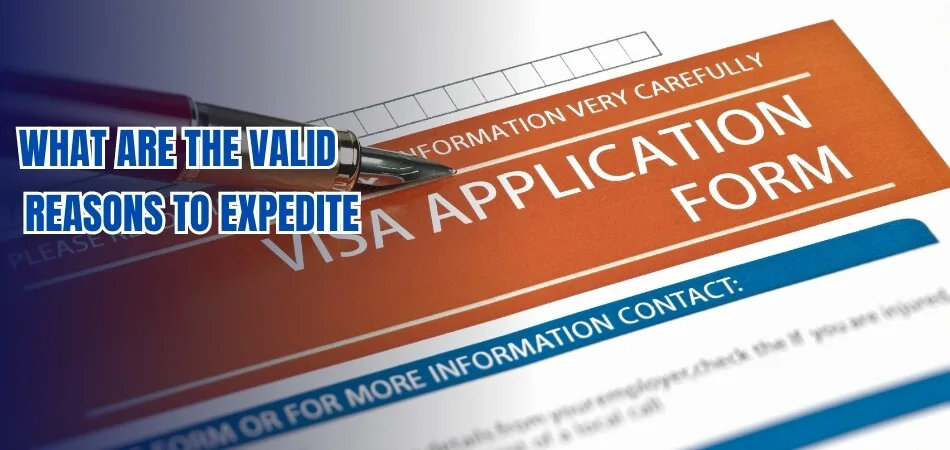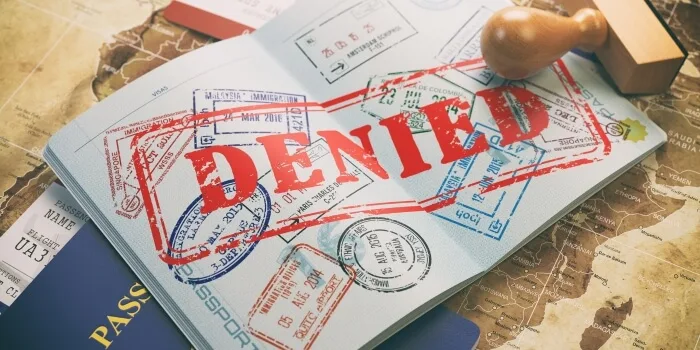What are the Valid Reasons to Expedite? It’s a question many applicants face when dealing with time-sensitive processes like visas, travel, or official documents. Expedited requests are not granted for convenience but for genuine emergencies or urgent needs. Understanding what counts as a valid reason is the first step to preparing a stronger case.
Valid reasons to expedite usually include medical emergencies, urgent travel for family matters, academic or professional deadlines, and humanitarian concerns. Each reason should be supported by clear evidence such as medical letters, death certificates, or official notices. This ensures your request is both credible and compelling.
If you’re preparing an application, knowing the valid reasons to expedite can save time and reduce stress. Take action now by reviewing your situation, gathering proper documents, and presenting a strong request. Being clear, accurate, and well-prepared will give you the best chance of approval.
What are the Valid Reasons to Expedite?
Different authorities treat expedite requests differently, and the valid reasons often depend on the type of application and the country involved. What qualifies in one situation may not work in another, so it’s important to match your case with the right category. Let’s break it down clearly.

USCIS Expedite Criteria
USCIS expedite criteria set out very specific categories for when a case can be pushed ahead. These reasons focus on urgent financial, humanitarian, or public interest needs where a delay could cause serious harm. Here are the main criteria with examples and proof you’ll need.
Severe Financial Loss
When a delay could cause a company or individual to lose significant money or even shut down, USCIS may consider expediting. For example, if a work permit isn’t approved in time, an employee could lose their job. Proof often includes contracts, payroll details, or letters from employers.
Urgent Humanitarian or Emergency Needs
Humanitarian cases usually involve health, safety, or urgent personal circumstances. These humanitarian reasons may include life-saving medical treatment, protecting a vulnerable person, or an urgent family matter. Evidence may be a doctor’s letter, hospital records, or legal documents showing the emergency.
Nonprofit Furthering U.S. Cultural or Social Interests
Nonprofit organizations that support cultural, educational, or social causes can sometimes request faster processing if delays would harm their activities. An example might be a cultural event or community program. Documents from the nonprofit explaining the urgency are needed.
Government or National Interest
If an agency or government body requests faster handling because it benefits national priorities, USCIS often honors it. For instance, a scientist contributing to a federal project may be prioritized. Letters from the government office involved usually serve as evidence.
Clear USCIS Error
Mistakes happen, and if USCIS admits a processing error, they can expedite to correct it quickly. This reason requires documentation showing the mistake, such as official notices or prior communications proving the error.
It’s worth noting that many family-based petitions fall under this process too, and applicants often ask about reasons to expedite I-130. These are typically tied to urgent humanitarian needs or severe hardship that would affect the petitioner or beneficiary if the case isn’t handled quickly.
U.S. Visa Interview (Consular) Valid Reasons
Consulates handle expedited interviews differently from USCIS. Their focus is on emergencies or time-sensitive events that cannot wait until the next available appointment. Below are the common reasons why a consular officer may approve a faster slot.
Medical Emergency
If someone needs to travel for urgent medical care, an emergency appointment may be possible. Applicants must provide a doctor’s letter and hospital records confirming the immediate need for treatment.
Funeral or Death of an Immediate Family Member
When a close family member passes away, expedited interviews may be granted so relatives can attend the funeral. A death certificate and proof of relationship are usually required.
School or Program Start Date
Students often need to reach the U.S. before classes begin. If the earliest available appointment is after the program starts, an expedited interview can be requested. Evidence includes the I-20, DS-2019, or admission letter.
Urgent Employment
Some job offers or assignments require quick travel, and in those cases, consulates may allow expedited appointments. Employers must issue a letter confirming the urgency and the start date of the employment.
Canada (IRCC) Urgent Processing Reasons
IRCC allows urgent processing in limited circumstances, but decisions are always made on a case-by-case basis. The focus is usually on family emergencies or critical job-related travel that falls within a short time frame. These are the main categories considered.
Travel Within Three Months Due to Illness, Death, or Job
If you need to travel for urgent reasons such as a family illness, a funeral, or a job-related matter, you may request urgent processing. You’ll need documents like medical records, a death certificate, or job proof.
Urgent Job Needs
Employment opportunities that require immediate travel can sometimes be considered. A letter from the employer confirming the necessity and timing is expected.
Program-Specific Urgent Cases
Some Canadian programs have their own urgent processing rules, depending on the nature of the case. Even if you qualify, approval isn’t automatic—IRCC decides case by case. Supporting paperwork and a clear explanation are always required.
Expedite requests only work when your reason matches official categories and you provide strong supporting documents. Whether through USCIS, a U.S. consulate, or IRCC, the key is proving why time matters and showing the consequences of delay. Working with a trustworthy conference organizer can also guide you in preparing requests for events or professional commitments. Always be clear, detailed, and honest in your request.
Comparison Table: Valid Reasons to Expedite (At-a-Glance)
If you don’t have time to read through all the details above, here’s a simple snapshot of the main agencies, the valid reasons they accept, the usual documents required, and how to make a request to expedite the process.
| Agency | Valid Reasons | Typical Evidence | How to Request |
| USCIS | Severe financial loss, urgent humanitarian/emergency, nonprofit interest, government/national interest, USCIS error | Employer letters, contracts, payroll proof, medical records, nonprofit/government letters, error notices | Contact USCIS through the online system or Contact Center; sometimes via congressional office |
| U.S. Consulates (Visa Interviews) | Medical emergency, funeral/death of family, school start date, urgent employment | Doctor/hospital letters, death certificate, I-20/DS-2019/admission letter, employer confirmation | Request an expedited appointment in the online scheduling portal with uploaded documents |
| IRCC (Canada) | Travel within 3 months (illness, death, job), urgent job needs, program-specific urgent cases | Medical proof, death certificate, employer letter, program documents | Submit urgent request with cover letter and marked envelope/email; decision made case by case |
Think of this table as your fast guide. It shows you the essentials at a glance, but if you need to build a strong case, be sure to check the full explanations above.
How to File an Expedite Request?
Knowing the valid reasons is only the first step. The real challenge is actually filing the request correctly with the right authority. Each agency has its own process, and following their instructions carefully makes a big difference. Let’s look at how you can do it step by step.
USCIS (United States Citizenship and Immigration Services)
- Start with the USCIS Contact Center
You can call or use Emma (the online chat system) to ask for your case to be considered for expedited review. - Explain Your Reason Clearly
When you contact them, be specific. Mention the valid reason (like severe financial loss or urgent humanitarian need). - Prepare Your Evidence
Have supporting documents ready, such as employer letters, medical records, or legal notices. They may ask you to fax or upload them. - Consider Congressional Help
In some cases, reaching out to your local congressional office can speed things up. They can submit the expedite request on your behalf.
USCIS Expedite Request Letter Example:
[Your Full Name]
[Your Address]
[Date]
USCIS [Service Center Name]
[Service Center Address]
Subject: Expedite Request for Case [Receipt Number]
Dear USCIS Officer,
I am requesting expedited processing of my case [Receipt Number] due to [insert valid reason: severe financial loss, urgent humanitarian matter, nonprofit interest, government request, or USCIS error].
Delays in this case will result in [briefly describe the impact, e.g., loss of employment, risk to health, missed opportunity].
Attached documents include:
- [Employer/medical/government letter]
- [Financial or medical proof]
I respectfully ask for your review and early consideration of this request.
Sincerely,
[Your Name]
[Contact Information]
U.S. Consular NIV (Nonimmigrant Visa) Emergency Appointment
- Log Into the Scheduling Portal
Go to the official visa appointment website and log into your account. - Request an Emergency Appointment
Select the option for an expedited interview and explain your reason (such as a medical emergency or funeral). - Upload Proof Documents
You’ll need to upload evidence, like a doctor’s note, a death certificate, or admission letters for school. - Wait for Approval
The embassy or consulate will review your request and let you know if an earlier appointment is approved.
U.S. Consular NIV Emergency Appointment Request Example:
[Your Full Name]
[Your Passport Number]
[DS-160 Confirmation Number]
[Date]
To: [Embassy/Consulate Name]
Subject: Emergency Appointment Request
Dear Consular Officer,
I am requesting an expedited visa interview for [Visa Type] due to [reason: medical emergency, funeral, school start date, or urgent employment]. The urgency is as follows: [explain briefly, e.g., surgery scheduled, funeral date, university start date, or confirmed job assignment].
Supporting evidence attached:
– [Doctor’s letter or hospital note/death certificate / I-20 or admission letter/employer letter]
I kindly ask for your earliest consideration of this request.
Respectfully,
[Your Name]
[Email and Phone Number]
IRCC (Immigration, Refugees and Citizenship Canada)
- Prepare a Cover Letter
Clearly explain why your case is urgent, whether it’s due to illness, death, or an urgent job need. - Attach Supporting Evidence
Include all proof, such as medical documents, death certificates, or employer letters. - Mark Your Request as Urgent
If submitting by mail, write “Urgent” on the envelope. For online applications, use the web form to flag urgency. - Wait for Case-by-Case Decision
Even with proof, approval isn’t guaranteed. IRCC reviews each request individually, so submitting a visa expedite request doesn’t automatically mean it will be approved.
IRCC Urgent Processing Cover Letter Example:
[Your Full Name]
[Your Address]
[Application Number, if available]
[Date]
Immigration, Refugees and Citizenship Canada
Subject: Urgent Processing Request for [Type of Application]
Dear Officer,
I am submitting this request for urgent handling of my [application type, e.g., PR card renewal, citizenship certificate] because of [reason: medical issue, family death, or urgent employment travel within 3 months].
The delay would cause [short explanation, e.g., missed treatment, inability to
attend a funeral, or loss of a job opportunity].
Documents included:
– [Medical/death certificate/employer letter]
– [Travel itinerary or related documents]
Thank you for considering my request on urgent grounds.
Sincerely,
[Your Name]
[Contact Information]
Filing an expedite request isn’t complicated, but it requires accuracy and the right documents. The stronger your evidence, the better your chances of approval. Take the time to prepare properly and present your case clearly, because once you expedite this request, you only get one good shot at it.
What Makes an Expedite Request Approvable?
Submitting an expedite request doesn’t guarantee approval. Agencies look closely at whether your case truly needs urgent attention, and they won’t accept vague explanations. To improve your chances, you need to meet a few clear standards. Let’s walk through them step by step.
Clear Evidence of Urgency
Authorities want to see more than just words; they need proof that the situation is urgent. A doctor’s note, court order, or employer’s letter explaining why time matters carries much more weight than simply saying it’s an emergency.
Impact of Delay
It’s important to show what happens if your request isn’t sped up. Will you lose your job? Miss critical treatment? Fail to meet a court deadline? Explaining the real consequences of waiting can make the urgency obvious to the reviewing officer.
Compliance with Guidelines
Each agency has its own rules on what qualifies as urgent. If your reason doesn’t fit into their categories, approval is unlikely. Make sure your request matches their official criteria and is written in a way that follows their process.
Supporting Documentation
Strong requests always come with documents to back them up. These can include medical records, employer letters, financial statements, or death certificates. Having clear, reliable paperwork attached shows that your request is serious and worth prioritizing.
Expedite approvals depend on solid evidence, real impact, and compliance with official rules, not just urgency in your eyes. If you can clearly explain your situation and prove it with documents, your chances of success go up greatly.
What to Do if Your Expedite Request is Denied?
Having an expedite request denied can feel frustrating, but it doesn’t mean you’re out of options. In most cases, the reason is something you can correct or improve. By taking the right steps, you can strengthen your chances if you decide to try again.
Review Denial Reason
The first step is to carefully read the denial notice and understand why your request was rejected. Agencies usually provide a short explanation, and this will guide your next move. Without knowing the exact reason, you may repeat the same mistake in a new request.
Gather Additional Documentation
If the denial was due to weak or missing proof, focus on collecting stronger evidence. For example, request a more detailed doctor’s note, updated financial records, or a clearer employer letter. Stronger documents show urgency more convincingly, which can make a big difference in the next review.
Submit a New Request
Once you’ve corrected the issues and added better documents, you can try again with a new request. Make sure to directly address the points raised in the denial. A well-prepared second request, backed by clear evidence, often stands a better chance of being accepted.
Escalate if Possible
Sometimes, you may be able to raise the matter to a higher level if the denial feels unfair. For USCIS, this could mean contacting a congressional office. For consulates, it may involve a follow-up inquiry. Escalation should be used carefully and with solid proof.
Consult Professional Advice
If you’ve been denied more than once or if the situation is complicated, seeking professional advice can help. An immigration lawyer or consultant may identify issues you missed and guide you toward a stronger request. Their experience can often make the process clearer and more effective.
Plan for Standard Processing if Necessary
Even with strong documents, not every expedite request gets approved. Always prepare for the possibility of following the regular processing timeline. This way, you can adjust your plans in advance rather than being caught off guard. It’s best to keep both options in mind.
A denial is not always the end; it can be a chance to improve your case. If your expedite request denial feels discouraging, use it as feedback to strengthen your next attempt. By reviewing the reason, adding better documents, and staying open to alternatives, you can handle the setback wisely and still move forward toward your goal.
Frequently Asked Questions
Reading about expedite requests often raises new questions, especially around small details that don’t always get explained in official guides. To make things clearer, here are some extra FAQs that many readers wonder about.
Can I Expedite More Than One Application at a Time?
Yes, it’s possible to request expedites for multiple applications if each has its own urgent reason. However, each request must be filed separately with supporting proof. Authorities review them individually, so approval isn’t guaranteed for all.
Does Paying Extra Speed Up an Application?
No, expedite requests aren’t about paying extra fees. They are only considered when urgent reasons fit official categories. If speed is needed for a standard process, check if premium services exist for that application type.
How Quickly Will I Hear Back on an Expedite Request?
Response times vary depending on the agency and the type of application. Some replies may come within days, while others can take a few weeks. Always plan for possible delays even after submitting your request.
Can an Employer File an Expedite Request for Me?
Yes, employers can submit a request on behalf of employees if the delay affects the company’s operations. They must provide a clear letter explaining the urgency and possible losses. Their support often adds weight to the application.
Is It Possible to Expedite Travel Documents for Children?
Yes, in some cases children’s applications can be expedited, especially for medical needs or urgent travel. Parents must provide full proof of urgency, such as medical letters or family-related emergencies. Each case is reviewed carefully before approval.
What Happens If I Forget to Include Proof In My Request?
Without supporting evidence, most expedite requests are denied quickly. Authorities need clear documents to confirm the urgency. You can usually reapply with proper proof, but it may delay your overall timeline further.
Can I Track The Status of My Expedite Request?
Yes, many agencies allow status checks online or through customer support. Tracking options differ depending on whether it’s USCIS, a consulate, or IRCC. Always keep your receipt or case number handy when checking.
Concluding Lines
When urgent situations come up, having the option to request faster processing can make a huge difference. These requests aren’t about convenience; they exist to help people when time is critical, such as health emergencies, legal deadlines, or family losses.
The key to approval lies in being clear and prepared. If you understand what are the valid reasons to expedite and back them with strong documents, you give your case the best chance of being reviewed quickly and fairly.
Eventually, remember that proof, timing, and clarity matter more than anything else. Use the right template, gather your evidence, and follow the official steps carefully. A well-prepared request can turn a stressful situation into one that finds a quicker resolution.







